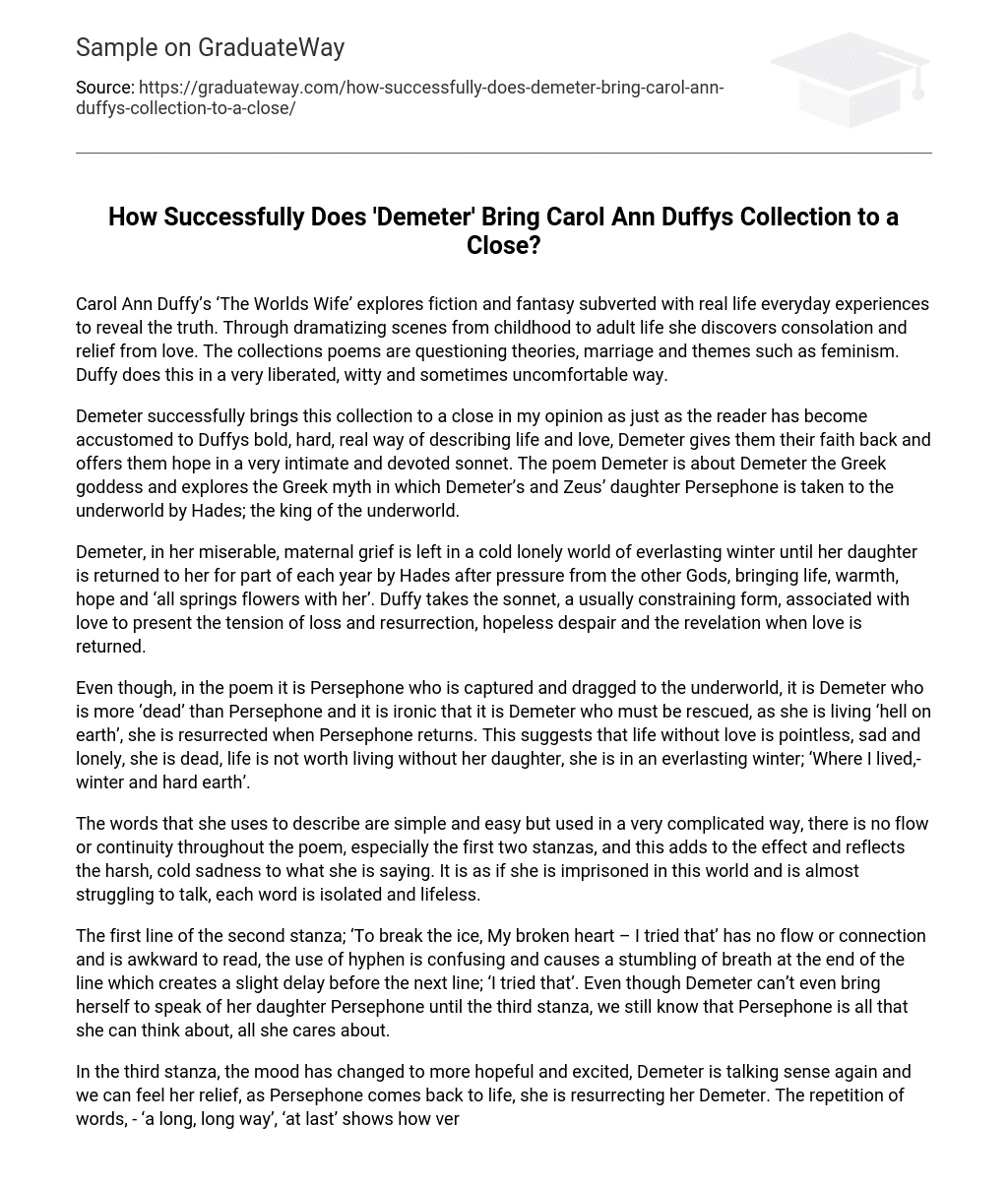Carol Ann Duffy’s ‘The Worlds Wife’ explores fiction and fantasy subverted with real life everyday experiences to reveal the truth. Through dramatizing scenes from childhood to adult life she discovers consolation and relief from love. The collections poems are questioning theories, marriage and themes such as feminism. Duffy does this in a very liberated, witty and sometimes uncomfortable way.
Demeter successfully brings this collection to a close in my opinion as just as the reader has become accustomed to Duffys bold, hard, real way of describing life and love, Demeter gives them their faith back and offers them hope in a very intimate and devoted sonnet. The poem Demeter is about Demeter the Greek goddess and explores the Greek myth in which Demeter’s and Zeus’ daughter Persephone is taken to the underworld by Hades; the king of the underworld.
Demeter, in her miserable, maternal grief is left in a cold lonely world of everlasting winter until her daughter is returned to her for part of each year by Hades after pressure from the other Gods, bringing life, warmth, hope and ‘all springs flowers with her’. Duffy takes the sonnet, a usually constraining form, associated with love to present the tension of loss and resurrection, hopeless despair and the revelation when love is returned.
Even though, in the poem it is Persephone who is captured and dragged to the underworld, it is Demeter who is more ‘dead’ than Persephone and it is ironic that it is Demeter who must be rescued, as she is living ‘hell on earth’, she is resurrected when Persephone returns. This suggests that life without love is pointless, sad and lonely, she is dead, life is not worth living without her daughter, she is in an everlasting winter; ‘Where I lived,- winter and hard earth’.
The words that she uses to describe are simple and easy but used in a very complicated way, there is no flow or continuity throughout the poem, especially the first two stanzas, and this adds to the effect and reflects the harsh, cold sadness to what she is saying. It is as if she is imprisoned in this world and is almost struggling to talk, each word is isolated and lifeless.
The first line of the second stanza; ‘To break the ice, My broken heart – I tried that’ has no flow or connection and is awkward to read, the use of hyphen is confusing and causes a stumbling of breath at the end of the line which creates a slight delay before the next line; ‘I tried that’. Even though Demeter can’t even bring herself to speak of her daughter Persephone until the third stanza, we still know that Persephone is all that she can think about, all she cares about.
In the third stanza, the mood has changed to more hopeful and excited, Demeter is talking sense again and we can feel her relief, as Persephone comes back to life, she is resurrecting her Demeter. The repetition of words, – ‘a long, long way’, ‘at last’ shows how very far they have been from each other and how long they have been apart from each other. Even though Persephone has only been in the underworld for our months it shows how love can be so torturing and makes every minute that they are apart feel like an eternity. It also shows how protective she feels of her daughter. Also how Demeter only ever refers to Persephone as ‘her’, ‘she’, suggests that she all that matters to her and all that she cares and thinks about, Demeter is dependent on her, she is her world.
She then refers to Persephone as ‘my daughter’, ‘my girl’, this reinforces the profound love that has consumed Demeter and again suggests that she is all that matters, Demeter’s use of language ‘my girl’ is almost romantic and reflects the complete ecstasy that Demeter is in when she returns, she so passionately loves her. Our perspective of the poem is soon changed from focusing on Demeter in the first stanzas to Persephone and what she looks like from her mother’s point of view.
The structure of the poem at this point makes the reader almost imagine the scene in slow motion to show how Demeter is so happy she is in a dream-like state; ‘across the fields, bringing all springs flowers with her’. Persephone is represented as an angel in her mother’s eyes Persephone is in bare feet suggesting vulnerability and innocence. Demeter’s language use in the fourth stanza is light, soft and almost fluffy; ‘bare, ‘swear’, ‘air’, the verse flows and has continuity suggesting that Demeter’s world inally fits together and makes sense, also that Demeter’s love is true and real ‘The small shy mouth of a full moon’ this final line of the poem suggests change and renewal to the reader and gives them hope and faith which is unusual for Carol Ann Duffy when compared to her other poems such as ‘Little Red Cap’ which finishes with; ‘Out of the forest I come… all alone’. Demeter’s final words; ‘small shy mouth of a new moon’ also suggest Persephone is an angel and is bringing a new life with her, a happy life.





